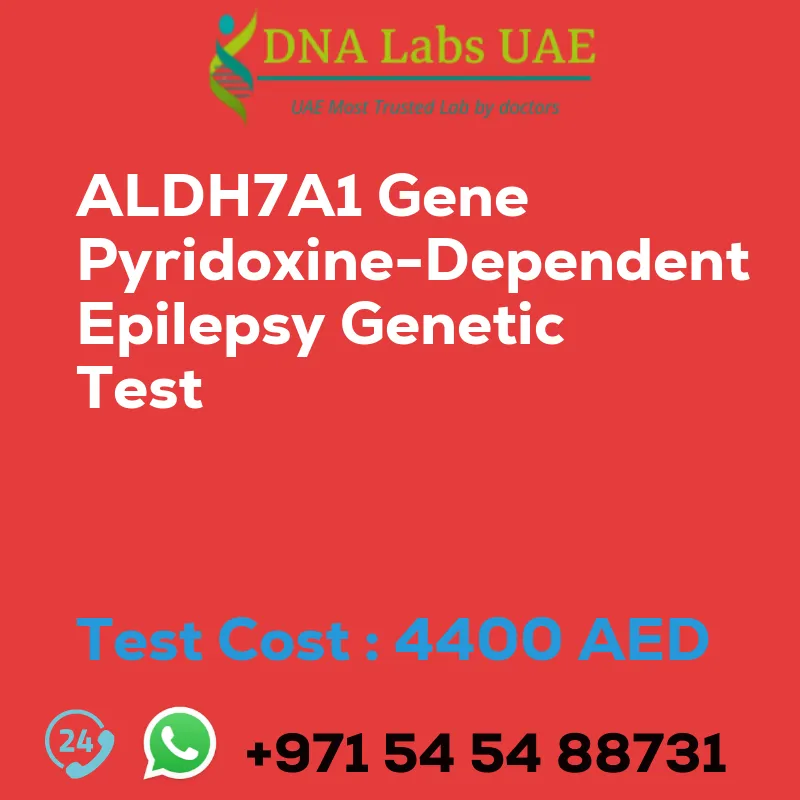ALDH7A1 Gene Pyridoxine-dependent epilepsy Genetic Test
Welcome to DNA Labs UAE, where we offer the ALDH7A1 Gene Pyridoxine-dependent epilepsy Genetic Test. This test is designed to detect mutations or variations in the ALDH7A1 gene associated with pyridoxine-dependent epilepsy (PDE), also known as antiquitin deficiency.
Test Components
The ALDH7A1 Gene Pyridoxine-dependent epilepsy Genetic Test includes the following components:
- Price: 4400.0 AED
- Sample Condition: Blood or Extracted DNA or One drop Blood on FTA Card
Report Delivery
The test results will be delivered within 3 to 4 weeks.
Method
The ALDH7A1 Gene Pyridoxine-dependent epilepsy Genetic Test utilizes NGS (Next-Generation Sequencing) technology.
Test Type
This test is specifically designed for the diagnosis of neurological disorders.
Doctor
The test is conducted by a neurologist.
Test Department
The ALDH7A1 Gene Pyridoxine-dependent epilepsy Genetic Test is conducted in our Genetics department.
Pre Test Information
Prior to undergoing the ALDH7A1 Gene Pyridoxine-dependent epilepsy Genetic Test, it is important to provide the clinical history of the patient. Additionally, a genetic counseling session will be conducted to draw a pedigree chart of family members affected by ALDH7A1 Gene Pyridoxine-dependent epilepsy.
Test Details
The ALDH7A1 gene is associated with pyridoxine-dependent epilepsy (PDE), a rare genetic disorder that affects the brain’s ability to metabolize pyridoxine, a derivative of vitamin B6. Individuals with PDE experience seizures that do not respond to traditional anti-seizure medications but can be effectively managed with high doses of pyridoxine.
NGS genetic testing is used to analyze multiple genes simultaneously, allowing for the identification of genetic variations or mutations associated with specific conditions. In the case of PDE, NGS genetic testing can detect mutations or variations in the ALDH7A1 gene, helping to confirm a diagnosis and provide valuable information for healthcare providers.
The ALDH7A1 Gene Pyridoxine-dependent epilepsy Genetic Test is not only useful for confirming a diagnosis in individuals with suspected symptoms but also for carrier testing in individuals with a family history of the condition. This information can assist healthcare providers in determining the most appropriate treatment and management strategies for individuals with PDE.
| Test Name | ALDH7A1 Gene Pyridoxine-dependent epilepsy Genetic Test |
|---|---|
| Components | |
| Price | 4400.0 AED |
| Sample Condition | Blood or Extracted DNA or One drop Blood on FTA Card o |
| Report Delivery | 3 to 4 Weeks |
| Method | NGS Technology |
| Test type | Neurological Disorders |
| Doctor | Neurologist |
| Test Department: | Genetics |
| Pre Test Information | Clinical History of Patient who is going for ALDH7A1 Gene Pyridoxine-dependent epilepsy NGS Genetic DNA Test A Genetic Counselling session to draw a pedigree chart of family members affected with ALDH7A1 Gene Pyridoxine-dependent epilepsy |
| Test Details |
The ALDH7A1 gene is associated with pyridoxine-dependent epilepsy (PDE), also known as antiquitin deficiency. PDE is a rare genetic disorder that affects the brain’s ability to metabolize the vitamin B6 derivative, pyridoxine. This leads to seizures that are unresponsive to traditional anti-seizure medications but can be effectively managed with high doses of pyridoxine. NGS (Next-Generation Sequencing) genetic testing is a method used to analyze multiple genes simultaneously, allowing for the identification of genetic variations or mutations that may be responsible for a particular condition. In the case of PDE, NGS genetic testing can be used to detect mutations or variations in the ALDH7A1 gene that are associated with the disorder. This type of genetic testing can help confirm a diagnosis of PDE in individuals with suspected symptoms and can also be used for carrier testing in individuals with a family history of the condition. It can provide valuable information for healthcare providers to determine the most appropriate treatment and management strategies for individuals with PDE. |








